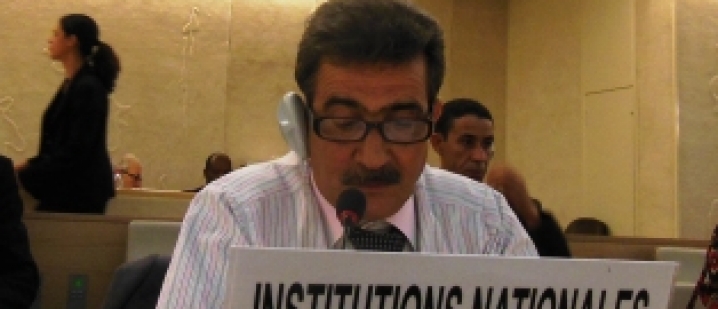UN WORKING GROUP ECHOES CNDH’S RECOMMENDATIONS ON ALTERNATIVES TO INCARCERATION AND PRETRIAL DETENTION
CNDH Secretary General Mohamed Essabbar took part on the 4th of September 2014 in the interactive dialogue with the United Nations Working Group on Arbitrary Detention about the report it drafted following its visit to Morocco, from 9 to 18 September 2013.
“The government responded positively to the recommendations of our report on mental health and human rights and worked to improve conditions in psychiatric hospitals” he declared in his statement. He called on the government “to speed up the implementation of the recommendations, mainly the adoption of the mental illness treatment law.
Concerning juvenile offenders, the CNDH recommended banning any institutionalization of a minor under fifteen years of age, even if it is on temporary basis and regardless the nature of the offense. CNDH Secretary General highlighted the urgent need to establish an independent complaint mechanism to which children should have easy access without any form of discrimination. The Council, CNDH Secretary General said, is committed to making efforts to investigate and to come up with relevant recommendations to ensure best human rights protection and promotion in Morocco.
In its report, the UN Working Group highlighted the efforts undertaken by the Moroccan government to establish and consolidate a culture of human rights in Morocco. It appreciated that the structural reform process has continued after its visit to the country. It welcomed the adoption of the constitution of July 2011, which expressly criminalizes arbitrary or secret detentions and enforced disappearances and considers them as crimes of the utmost gravity (Article 23), taking note of the measures taken against these practices. The report also welcomed the establishment of the National Human Rights Council, as an independent national institution for the protection and promotion of human rights.
Most of WGAD’s recommendations concerning detention are similar to the recommendations of the CNDH’s thematic reports (on prison conditions, psychiatric hospitals, juvenile in conflict with the law, and migration) and memorandums (on military justice and alternatives to incarceration).
Regarding detention conditions, Ms Taghreed Jaber, member of the UN Working Group immediately noted that overcrowding is a major reason behind the deterioration of prison conditions. She called for a review of the penal code to include alternatives to incarceration (as recommended in CNDH’s memorandum) and additional measures for reintegration, mainly by strengthening the role of Mohammed VI Foundation for the Reintegration of Prisoners.
The UN Working Group also took note of the excessive use of preventive detention in Morocco, a conclusion that the CNDH already highlighted in its report on prison conditions, published in December 2012.
Speaking on behalf of the Moroccan government, Mr. Mahjoub El Haiba, chairman of the inter-ministerial department for human rights said that the visit of the UN Working Group to Morocco was important indeed but it was not an end in itself. Such visits, he explained, should lead to a truly interactive and permanent platform for dialogue and cooperation between the government and the UN independent experts.
The Moroccan government welcomed the recommendations of the UN Working Group and explained that most of them are already engaged in the context of the reform packages undertaken by the country. “Morocco has developed a comprehensive approach to ensure follow-up to and implementation of the recommendations of all UN human rights mechanisms. A plan of action on this regard was adopted in 2013, emphasizing, as an example, positive interaction with the UN Special Rapporteur on Torture”, Mr. El Haiba declared. The Moroccan government wishes to follow the same approach to follow up on the recommendations of the Working Group on Arbitrary Detention, hoping to establish a “best practice” in the interaction between governments and UN independent experts, he said.























